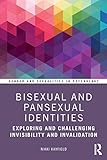Bisexual and pansexual identities: exploring and challenging invisibility and invalidation
By: Hayfield, Nikki
Language: English Publisher: United Kingdom -- Routledge -- 2020Description: 131pISBN: 9781138613775Subject(s): Social sciences| Item type | Current location | Collection | Call number | Status | Date due | Barcode |
|---|---|---|---|---|---|---|
 Reference
Reference
|
Central Library Reference (Sahyadri Campus) | Reference | 306.765 HAY/B | Not for loan | 07866 | |
 Book
Book
|
Central Library General Stack (Nila Campus) | 306.765 HAY/B | Available | 07867 |
* A history of bisexual invisibility within sexology and psychology
* Invisible or invalidated : the marginalisation of bisexual identities
* In/visible visual identities
* The erasure and exclusion of bisexual, pansexual, asexual, and plurisexual people within education, employment, and mainstream mass media
* Becoming visible and reflecting on visibility
This book explores the invisibility and invalidation of bisexuality from the past to the present and is unique in extending the discussion to focus on contemporary and emerging identities. Nikki Hayfield draws on research from psychology and the social sciences to offer a detailed and in-depth exploration of the invisibility and invalidation of bisexuality, pansexuality, and asexuality. The book discusses how early sexologists' understood gender and sexuality within a binary model and how this provided the underpinnings of bisexual invisibility. The existing research on biphobia and bisexual marginalisation is synthesised to explore how bisexuality has often been invisible or invalidated. Hayfield then evidences clear examples of the invisibility and invalidation of bisexuality, pansexuality, and asexuality within education, employment, mainstream mass media, and the wider culture. Throughout the book there is consideration of the impact that this invisibility and invalidation has on people's sense of identity and on their health and wellbeing. It concludes with a discussion of how bisexuality, pansexuality, and asexuality have become somewhat more visible than in the past and the potential that visibility holds for recognition and representation. This is fascinating reading for students and academics interested in in bisexuality, pansexuality, and asexual spectrum identities and for those who have a personal interest in bisexuality, pansexuality, and asexuality.
